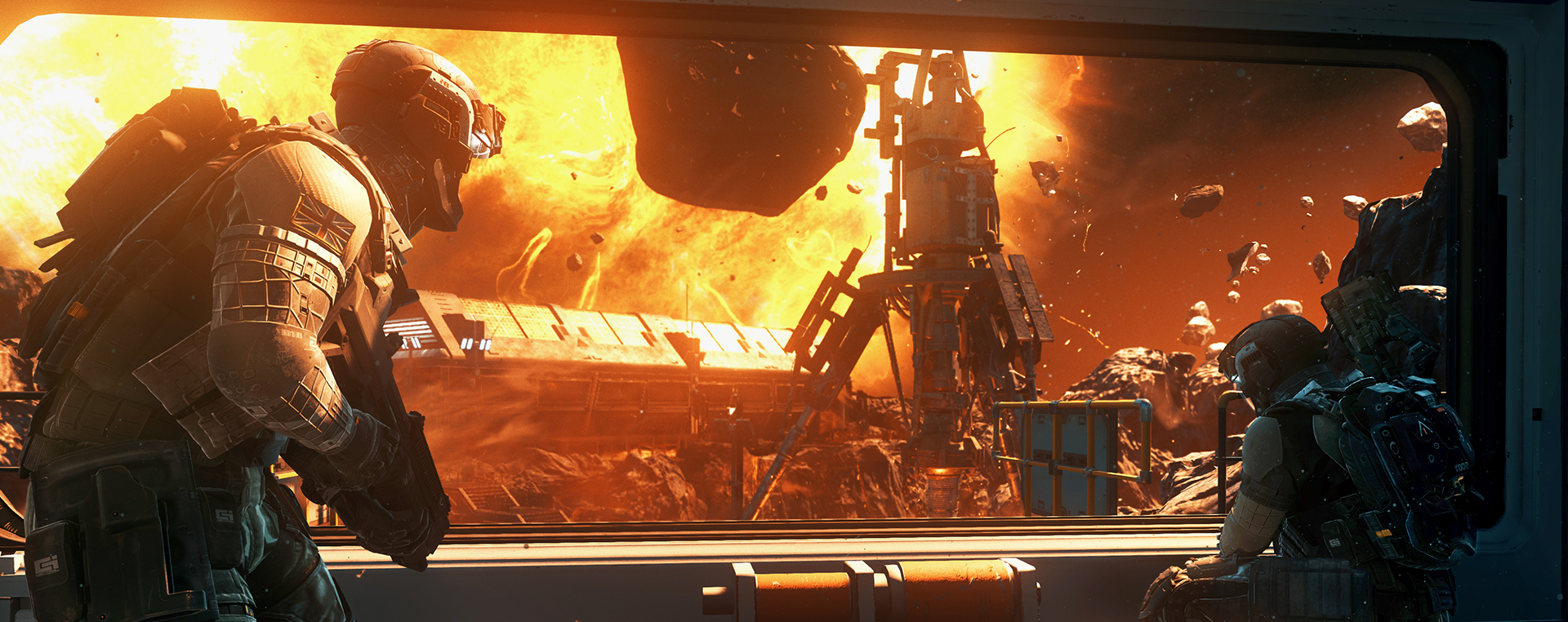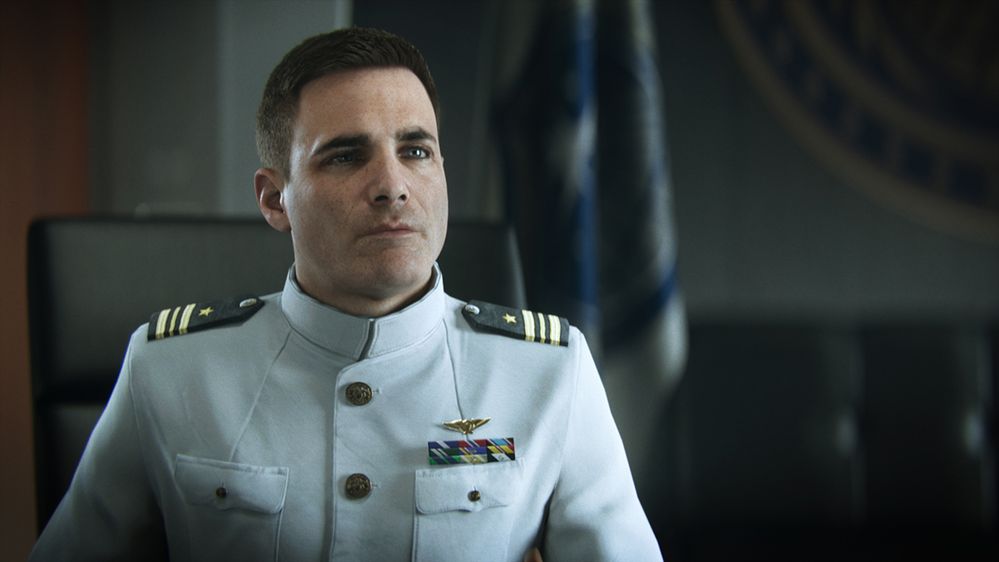
Call of Duty: Infinite Warfare has an ambitious campaign that takes players off-planet and plunges them into the midst of a galactic war taking place throughout our solar system. You take on the role of Captain Reyes, a Tier 1 Special Operations pilot who unexpectedly takes the helm of the Retribution, one of Earth’s last remaining warships.
We sat down with Taylor Kurosaki, Infinity Ward’s Narrative Director, to talk about the epic, military spacefaring campaign in Call of Duty: Infinite Warfare, and to find out how the team approached the development process.
Activision Games Blog: First of all, what is your game development background?
Kurosaki: The first video game I ever worked on was Crash Bandicoot, the very first one. I was employee number two at Naughty Dog and a large part of that game was made with five people total, including the two founders of the company. I think by the time we shipped the game, I think we were at eight people.
Who was employee number one?
Bob Rafei, who went on to become the art director at Naughty Dog for many, many years. So, I worked on Crash Bandicoot and then kind of took a hiatus from gaming for a while. I have a film and TV background, and so I went back into the television world.
Then the aforementioned Bob Rafei gave me a call one day, I think around the end of 2003 and said, "Hey, could you come help us with some cutscenes and some dialogue temporarily?" So I kind of found myself back at Naughty Dog. It had gone from eight people when I left to maybe 35 or 40, when I went back. That was to work on Jak 3, and I stayed there for another decade plus working on all four of the Uncharted games before starting at Infinity Ward in 2014.
I’ve heard a story that you almost literally pulled your former Naughty Dog co-worker Jacob Minkoff out of the jungle to work with you on Infinite Warfare.
That's my partner in crime, Jacob Minkoff. Jacob and I were great friends at Naughty Dog, had worked together for many years there, and Jacob decided that he wanted to exit the business and go off the grid, so to speak. He sold his house and he sold his truck and he gave away his dog and a bunch of his worldly possessions, and he was living with me before he shipped off to go to the jungle, waiting for his tax returns and that kind of stuff to clear.
While he was staying with me, just kind of in our guest room, I had started talking to Infinity Ward about going and working there and he and I together started to watch old war movies, started to play the old Call of Duty games and had these fun brainstorm sessions about what we would do if we made a Call of Duty game together. I said, "Man, I would really love to do this with you. I wish you weren't shipping out into the jungle." He said, "Yeah, it would be fun, but another time another place, maybe."
He took off and I continued my conversations with Infinity Ward. When they offered me a job, I sent him an email and he said that he was going to be upriver and really, virtually, inaccessible. Maybe once a month or something, he would trek down into the nearest town and he could check his email and that kind of stuff. I sent him a message and just said, "I really wish you were doing this with me, but I understand that it's not going to be. Hopefully when you check this a few weeks from now, you'll know that I'm thinking about you."
I got a response from him the next day. He was actually in town and he said, "Yeah, most of the people at the camp I'm staying at are coming down with malaria and I'm not really into that, so let's do a thing." He was basically flown out of the jungle by Infinity Ward and he and I started in short order after that working on Infinite Warfare together.
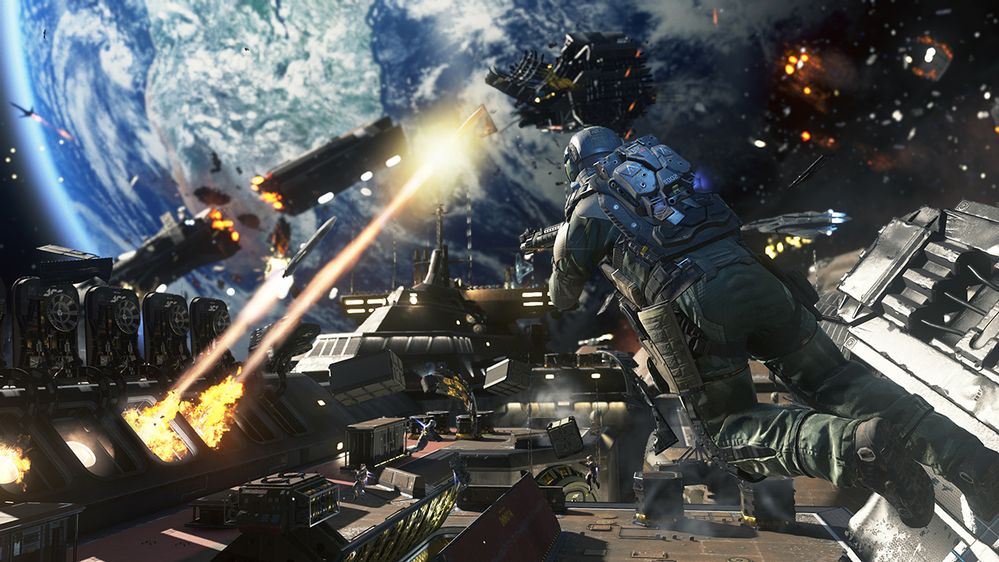
So let’s talk about the narrative. Why did you decide to go to space this time?
The team at Infinity Ward had some really interesting ideas about what they wanted to do next in Call of Duty. Gameplay concepts like a seamless approach, which again, for Jacob and I, was right up our alley. No loading screens. That kind of: you pick up the controller and you never put it down mindset. We were very much into that.
They had some ideas about having mission choice, which was again, something new for the Call of Duty franchise. That was a really interesting challenge for us as well because all the games we had worked on were pretty much linear in their structure.
So, watching all these military war stories on TV and film and reading books, we saw two patterns emerge. We saw the war story that was told from the viewpoint of a solider, an infantryman, and we saw the war stories told from the viewpoint of a leader. We thought, if you're going to have mission choice, well, then you're a leader. You're choosing where to go.
So we decided to go with that and we were off and running. We decided that we were going to tell the story of a war through the eyes of a leader, and the themes that you see in those kind of stories come up over and over again are that it's not about necessarily bringing everyone home, it's not about fighting for the guy next to you. It's about completing the mission, and the mission coming first above everything else.
In Saving Private Ryan, Captain Miller, played by Tom Hanks, his character learns that it's not about getting home to see his wife, it's not about getting the rest of his guys home to their loved ones, it's about saving Private Ryan. We wanted to tell a story that followed that same thematic principle and there you have Captain Reyes who has to, in very short order, go from a mindset of being a squadron commander where he believes in getting his men home, to very quickly evolving into a guy who understands that the mission comes first.
Sacrifice is a big part of this story. How important was it for you to include that?
We wanted to tell a story that felt authentic, and if you're going to tell a story about the burden of leadership, which means you know very well that you are ordering your men into harm's way and then must live with the repercussions of those orders. There had to be repercussions. If you were part of a superhero squadron and everyone got out okay and everyone was unscathed, we really wouldn't be doing that theme or that notion about that burden any justice. We wouldn't be doing it any favors, and we really wouldn't be honoring it.
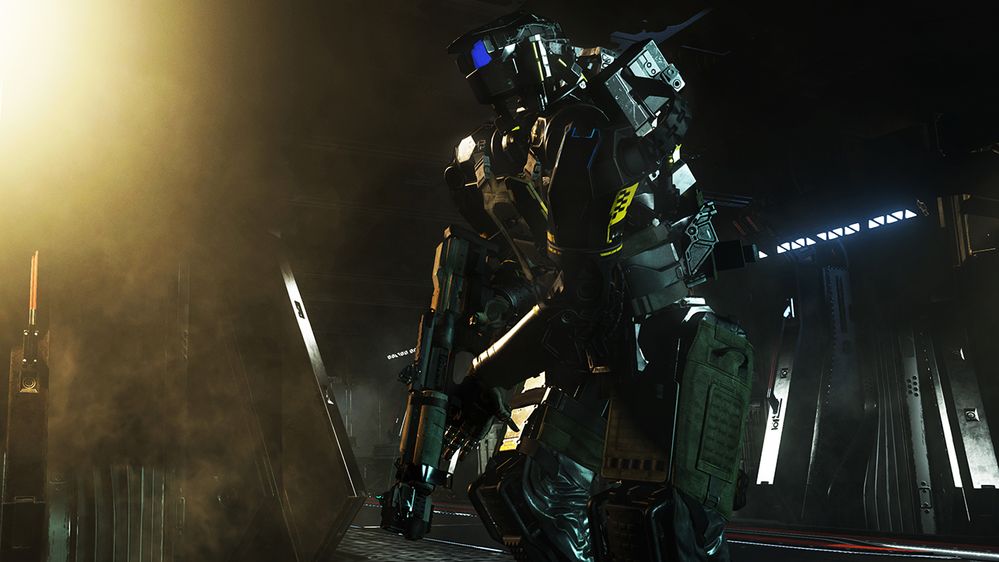
One of the most unique characters in the game is the Enhanced Tactical Humanoid 3rd Revision, or Ethan. He’s a robot, but in many ways he feels more human than some of the people you encounter in the game. What went into creating him, and was he always envisioned as a robot?
All of our characters were open to being different genders and different nationalities in the beginning stages. We put pins in the board, so to speak, literally and figuratively. We knew that we had to have a protagonist. We knew that they had a best friend wingman, and we knew that there was this other character, and in this case, that ended up being a real “other,” who was sort of a surrogate for us as the audience.
So, no. Ethan wasn't always going to be a robot and Salter wasn't always going to be a woman. It was really about finding out who these characters were. We weren't going to do Ethan as a robot if we felt like it couldn't work. We promised ourselves right off the bat that we were not going to go forward and make him what he eventually was if he didn't feel original and if he didn't feel appropriate to the Call of Duty universe.
A lot of people do robots in games, TV shows and movies. We said, "What's different about this guy? What's the reason to have him be a robot?" We thought very quickly that he needs to be the ultimate soldier. But what does that mean? Well, the ultimate soldier is not only someone who is well-trained and proficient at his job, but he's also someone who is the consummate squadmate.
That means if you're looking at war through the lens of a soldier, you're seeing that a soldier's duty is to protect his buddy. A soldier's duty is to make sure that everybody comes back home. Ethan's overriding, overarching goal, is to always protect his fellow soldiers, and in some cases, it's Reyes, his commanding officer. That's his mindset.
What do soldiers who are thrown into the theater of war together do to endear themselves to one another, and what do they do to help each other get through these really trying times? In a lot of cases, they use humor. They use humor as a coping mechanism because it's weird. Our research showed us that in war, there are a lot of very mundane, boring, stir crazy moment, and a lot of extremely dangerous, intense moments, and not a lot in between.
To get through that experience, to survive those low moments, and to get through the more intense moments, soldiers use humor as a way to endear themselves to one another, and as a way to keep their mind off of the fact that death could be around any corner. Ethan has that humor chip as part of his personality, and it's a way that his squadmates feel comfortable around him.
He's very different than them. He doesn't look like anyone else. Giving him a way to engender himself to the people he's fighting with was key. It's the thing that wins people over to him, like Omar. Omar's a tried and true, dyed in the wool Marine who believes in boots and bombs and not a lot of tech, so of course he's skeptical of Ethan, but he's also no dummy. Omar eventually recognizes that Ethan is a very valuable member of this team and once he understands that, he wants him along for the ride.
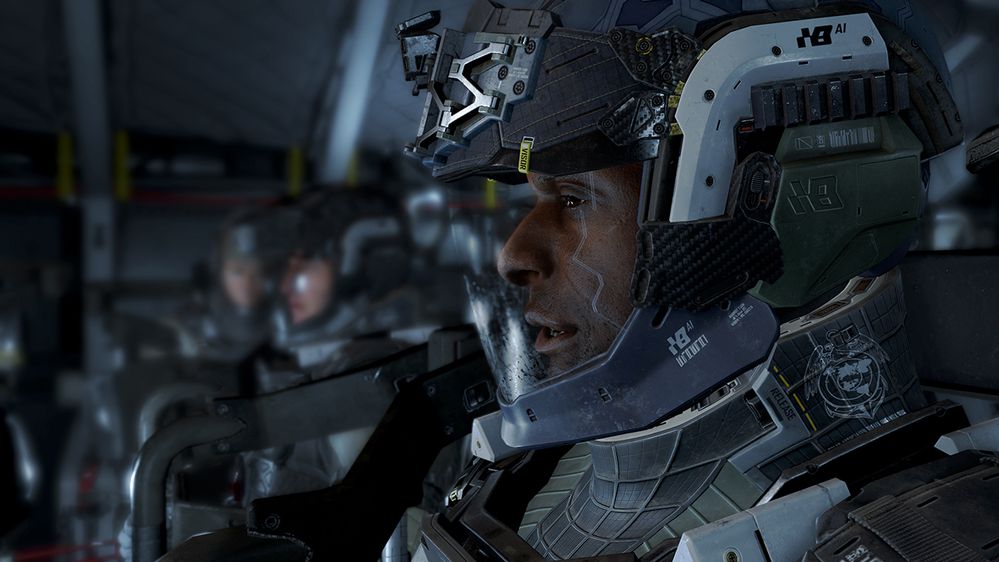
Earlier you mentioned Saving Private Ryan. What other kind of research and movies did you guys look into?
With war stories, in particular, we looked at everything from Steven Pressfield's Gates of Fire, which talks about the Spartan warriors at the gates of Thermopylae. They're soldiers. They're human soldiers fighting a human enemy and they're relatable. For war, we looked at everything from that to Black Hawk Down, to Saving Private Ryan.
In terms of in things that take place more in the science fiction setting, it was really looking at production design. I’m a big fan of James Cameron, who has a really interesting way of combining the familiar and the unfamiliar. When you combine those in an effective way, it grounds your whole universe and makes it more believable, more relatable.
Call of Duty occupies a universe that doesn't have monsters or aliens or giant blue people. We are in a plausible future where it's a human versus human conflict, same as what it would be on Earth. But one of the things Cameron does is that he knows that he's going into unfamiliar worlds, so he brings the familiar with him. What you have in Aliens and in Avatar are these heavy, tactile components. You have cockpits that are made of glass and steel and have heavy switches, you have helmets that look like they're more from the Vietnam era than they are from some imagined, science fiction world.
We do a lot of that same stuff, and we worked really hard to do that. We really examined the aesthetics of the modern Navy and what makes a warship feel like a warship. We looked at the colorings, the kind of materials that were used, the design aesthetics, and then we examined what NASA’s design language is. That is, things that are built to survive the rigors of space.
We sort of mashed those things together and that's the aesthetic that you see on the Retribution where it feels like a real place because you see design cues from things that you know from NASA and from the Navy. Many of our players have probably never been on a Navy warship before, but I guarantee that even fewer of them have been to Titan or Europa or the surface of Mars. So going to these fantastic places, it requires you to bring the familiar with you. That way you feel a bit at home.
The campaign has a lot of variety, ranging from straightforward military missions, to survival horror, to space dogfighting and more. What were the biggest challenges for the team to encompass everything?
We were always asking ourselves, “Does it feel like Call of Duty?” Could we do a take on these things so that it still feels like we're big fans of the franchise? Some of our most formative gaming experiences have been playing the original Call of Duty, or Call of Duty 2 or Call of Duty: Modern Warfare. Having the responsibility to do honor to the franchise but to push it forward in meaningful ways, that was always our litmus test.
Could you have an abandoned mining facility that's rotating close to the sun where you don't know what's happened? There's a mystery. What's happened to the civilian miners? Could you port that to Call of Duty? Would it feel like Call of Duty? I think that any time we could say, "Yes, absolutely, and here's how," then we gave ourselves a green light. Any time we were like, "No, that doesn't feel like it," then we shelved that and went on to the next thing.
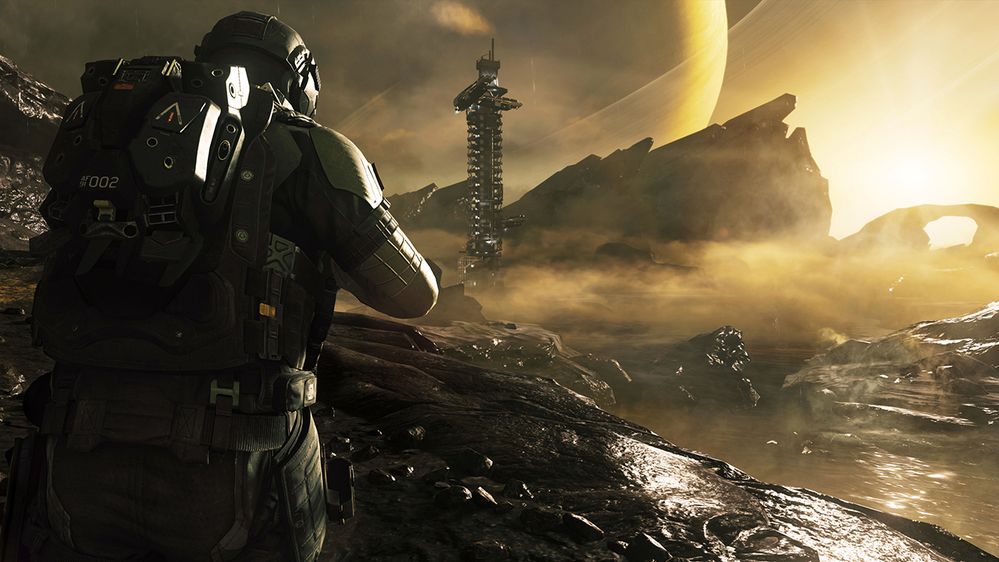
2010 famously warned the astronauts not to attempt to land on Europa, which is one of the first places you go in Infinite Warfare. Is that a tongue in cheek reference?
Yeah, we're big students of science fiction like Robert Heinlein’s The Moon Is a Harsh Mistress and things like that. We’re also aware of the other properties out there and how they've portrayed these various moons and planets and things like that.
The thing is, Europa is full of water. It's a place that you would actually want to be, despite what they say in 2010. It would be a vast source of resources and again, as a grounding point and a jumping off point, all wars have really been over resources. If we're running short on certain resources here on Earth, and those resources are in great abundance in our solar system, then that's a perfect opportunity for conflict and also a perfect opportunity for settling conflict through armed means.
It felt like a perfect jumping off point, and we wear our influences on our sleeves. We are fans of the science fiction genre and of the war genre, and so putting those two things together is what you're going to see in Infinite Warfare.
We would like to extend a big thank you to both Taylor and Infinity Ward for this interview. Call of Duty: Infinite Warfare is now available worldwide, so jump in and experience the story firsthand.
For more intel about Call of Duty: Infinite Warfare, be sure to visit CallofDuty.com/infinitewarfare and follow @CallofDuty and @InfinityWard on Twitter.

